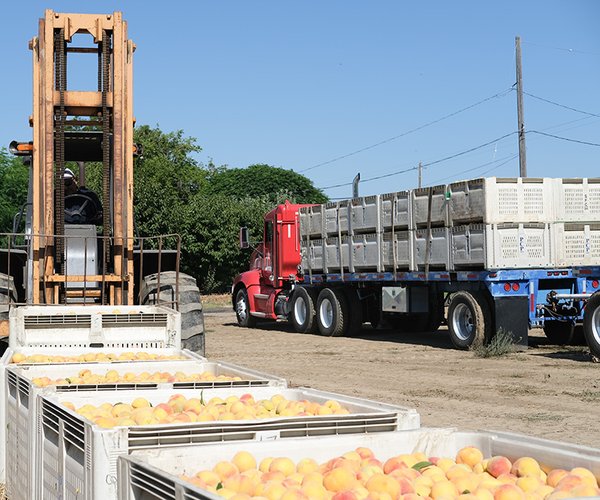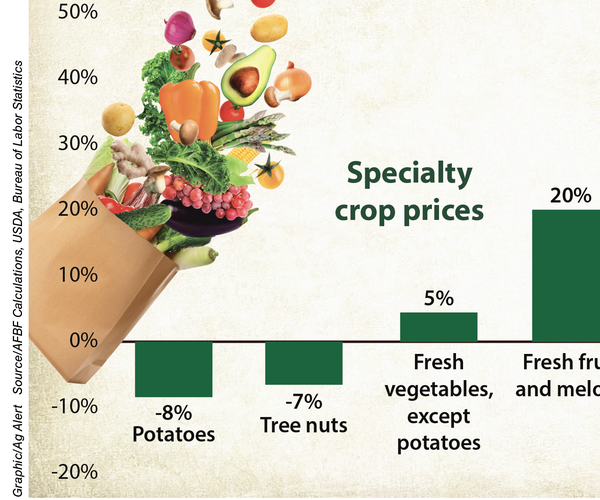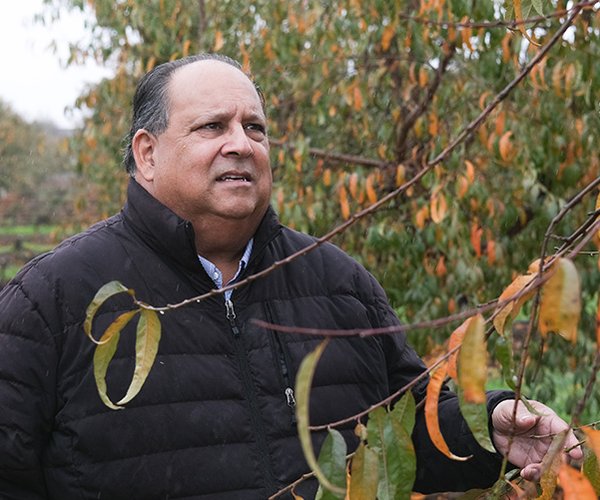By Ching Lee
Ag Alert
With Congress facing end-of-fiscal-year funding deadlines and the expiration of the farm bill extension, a delegation of California Farm Bureau leaders traveled to Washington, D.C., last week to ensure priorities for California farmers and ranchers were heard while decisions were being made.
Among those on the Sept. 15-18 trip were Farm Bureau officers, board members and the organization’s policy advocacy team. Issues they covered included the farm bill, agricultural labor and international trade.
The delegation’s visit to the nation’s capital comes at a critical time as a one-year extension of the current farm bill is set to expire Sept. 30. In July, President Donald Trump signed the One Big Beautiful Bill Act, a major reconciliation package that included many items historically addressed via the farm bill.
“Unfortunately, many titles and provisions were left out, meaning a Farm Bill 2.0 or ‘skinny’ version still needs passing,” said Matthew Viohl, a policy advocacy director for the California Farm Bureau.
In meetings with legislators and their staff, the group stressed the importance and urgency of Congress passing the provisions unaddressed in the reconciliation package to provide certainty for farmers and ranchers.
Specifically, they urged congressional representatives to continue expanding crop insurance and risk management tools, pointing out that less than a quarter of the roughly 400 commodities produced in California are covered by direct crop insurance programs.
“That means most of the state’s farmers have been unable to use crop insurance in a meaningful way,” Viohl said.
As a result, many specialty crop growers operate without a federally supported safety net, are forced into primitive and limited policies or must default to the Noninsured Crop Disaster Assistance Program, he added. Farm bill reauthorization presents an opportunity for Congress to reform crop insurance so that it works more effectively for specialty crop farmers, Viohl said.
As an organic dairy farmer in Humboldt County, Ron Vevoda made the point that current government crop insurance programs are not designed for his sector. For example, the Dairy Margin Coverage Program, which protects against low milk-feed price margins, is based on national conventional milk prices and conventional feed costs.
“If I’m having a bad year and (conventional dairy farmers) are having a good year, I don’t have any assistance whatsoever,” he said.
The Farm Bureau delegation also advocated for stronger forestry and conservation programs in the farm bill to better equip federal agencies to manage forests, incentivize more public-private partnerships, grow new markets for forest products and support rural communities.
As the Trump administration’s immigration crackdowns and enforcement actions continue to strain U.S. farm employers who rely heavily on foreign-born workers, Farm Bureau leaders emphasized the need for a reliable workforce to sustain the nation’s food production and address labor shortages that threaten food security.
“We know that’s been a very hot-button issue, particularly during the last eight or nine months,” California Farm Bureau President Shannon Douglass said.
Though worker shortages have always been a challenge for California farmers, whose labor-intensive specialty crops often lack mechanized planting and harvesting tools, she said there’s opportunity to make improvements, especially to the costly and complex H-2A visa guestworker program, while also protecting the existing domestic workforce.
April England, a Monterey County agricultural consultant, said all the representatives the delegation met with were receptive to the concerns Farm Bureau raised and said they were willing to help. There was agreement that Congress should pass a full farm bill that’s more workable for farmers and that labor issues for agriculture should be addressed.
“Although we are making advancements with mechanization with specialty crops, especially in my county with strawberries, artichokes and other commodities, we still need a workforce,” England said.
Vevoda said some farm employees have been employed by the same farm and have worked in the industry for years, even decades, and he would like to see “a pathway for them to be here legally.” In discussions with congressional offices and federal agencies, the delegation called for an earned work status for existing farm employees as part of any immigration reform.
Export trade remains critical for California farmers, as many of the state’s agricultural products “make their way to foreign markets to get the best return for our growers,” Douglass said. Farm Bureau leaders urged lawmakers to strengthen existing trade agreements, expand export markets through new trade deals and enforce trade rules without broad tariffs that trigger retaliation against California crops.
“Instead of asking for relief dollars, we’d prefer to have markets and be able to sell our products in different parts of the globe,” Douglass said.
Even so, the delegation pointed out that specialty crop producers have often been left out of past trade aid and must receive fair protection and compensation when trade disputes disrupt markets.
While Farm Bureau supports fair trade, Douglass said, the delegation made the point that some agricultural sectors have been negatively impacted by retaliatory tariffs and urged measured and justified tactics rather than trade wars. They cited a University of California study last year that estimated the Golden State could lose up to $6 billion in economic value from just a 10% across-the-board retaliatory tariff.
“We want to support American products—and we do,” Douglass said. “But we want to be able to trade with our neighbors, too.”
England said congressional members expressed frustration with the outcome of some trade issues, though they said they were willing to discuss and work on alternatives.
“It’s just that everybody feels like their hands are tied and they don’t really have much input on negotiating any of that,” she added.
Douglass said it remains vitally important for Farm Bureau members to share their stories with lawmakers and for congressional members to hear directly from their constituents, especially about agricultural issues. Combining the information that Farm Bureau provides with farmers’ real-life stories “can make our message that much more impactful,” she added.
“Oftentimes, our elected representatives pass a bill, and they can be very well-meaning but don’t realize the impact it would have on the ground,” Douglass said. “They have to hear from us.”
Ching Lee is editor of Ag Alert. She can be reached at clee@cfbf.com.
Courtesy of the California Farm Bureau.





